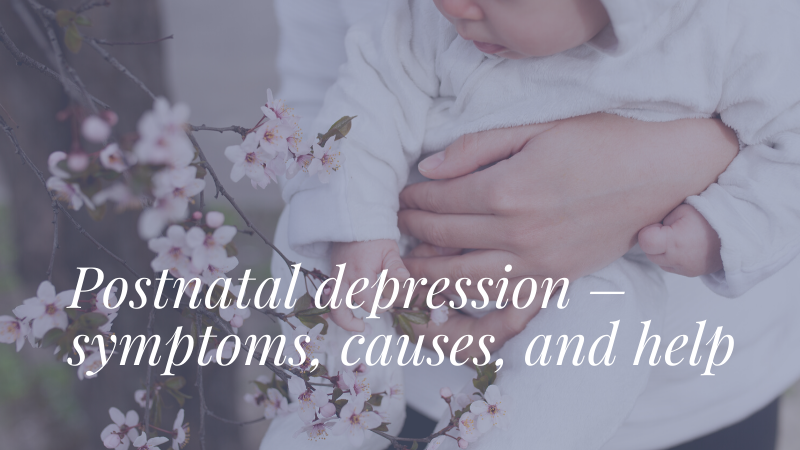Postnatal depression is the term used for depression that some women experience in the first year after having a baby.
Symptoms of postnatal depression may start as baby blues and then get worse. The symptoms may take some time to develop. Moreover, postnatal depression may be most obvious when your baby is 4 to 6 months old.
Furthermore, postnatal depression can last for longer than three months. If not treated, it can last considerably longer. The earlier it is recognized, diagnosed, and treated, the faster you will recover.
The Baby Blues
The ‘baby blues’ are so common they are considered normal for new mothers. They usually begin 2 – 4 days after your baby is born. You may have crying spells, increased feelings of vulnerability, irritability, loneliness, and weariness. Although you may find it distressing, the baby blues will pass quickly, usually within a few weeks, with support from your partner, family, and friends.
Puerperal psychosis
Puerperal psychosis is the most extreme, and rarest, form of postnatal mood change. It affects 1 in 500 new mothers. Puerperal means the six weeks after childbirth and psychosis is any form of mental illness in which you lose contact with reality. Symptoms begin soon after the birth, usually with the mother becoming restless, mildly confused, and unable to sleep. This form of depression usually requires hospital care.
Post Natal Depression
Postnatal depression falls somewhere between the baby blues and puerperal psychosis. It may affect up to 1 in 6 new mothers, although some experts believe it affects more than this. Symptoms may start as baby blues and then get worse, or they may take some time to develop.
Around 15% of new mothers in Ireland experience postnatal depression. The earlier it is recognized, diagnosed, and treated, the faster you will recover. Postnatal depression can last for longer than three months and even years if not treated. Often a family member or friend will notice that there is something wrong before you do.
Causes of Post Natal Depression
- Birth Experience
- Biological Factors
- Changes in Lifestyle
- Relationships
- Stressful Life Events
- Personal History
- Images of Motherhood
Signs of postnatal depression
Postnatal depression can have a broad range of symptoms. These can vary in how severe they are.
However, you may be feeling sad, anxious, and alone. You may be feeling guilty, irritable, and angry. Or, you may be experiencing panic attacks. You may not enjoy being with people, even your baby.
Other symptoms of postnatal depression include:
- loss of appetite
- poor concentration
- tiredness all the time
- problems sleeping
- being agitated
- crying easily
Feelings and thoughts you might experience include:
- feeling inadequate
- feeling panicked
- thinking and feeling that you are rejected by your baby
- worrying a lot about your baby
Self-Help Strategies
However, the most important thing you can do is ask for help. Seek help early. The sooner you get help, the better you will feel. Talk to your partner, family, and friends. Talk to your GP and public health nurse. Seek psychotherapy/counseling.
Be open about your feelings. This will help others understand what you need. Another things that you can do, to get better are:
- Rest.
- Be open about feelings and worries.
- Eat well.
- Ask for help with practical issues e.g housework, cooking, etc.
- Set aside time for relaxing with family and friends.
- Organize a daily treat.
- Find time to have fun.
- Try to be active or spend some time outside.
- Find time for yourself.
- Meet other mothers.
Support groups
Postnatal Depression Ireland 021 492 2083 www.pnd.ie
Samaritans 24hr listening service 116 123 www.samaritans.org
Parentline 1890 92 72 77 www.parentline.ie
Cuidiú-Irish Childbirth Trust 01 872 4501 www.cuidiu-ict.ie

